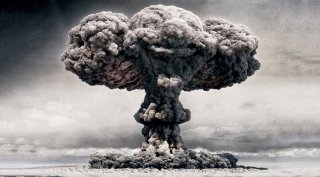Why Iran’s ‘Nuclear Fatwa’ is Nuclear Nonsense
Iran’s fatwa against building nuclear weapons is a myth.
In 1962, President John F. Kennedy observed that “The great enemy of the truth is very often not the lie, but the myth—persistent, persuasive and unrealistic.” When it comes to Iran’s nuclear weapons program there is no shortage of either lies or myths. And regrettably, in the West, there is no shortage of those who are willing to disseminate them.
Among the most persistent myths is that of the so-called Iranian nuclear fatwa.
In recent reports, mainstream news outlets like AP have claimed that a “fatwa, or religious edict” by Iran’s “Supreme Leader Ayatollah Ali Khamenei states that nuclear weapons are forbidden.” A Washington Post dispatch uncritically quoted Mahmoud Alavi, the regime’s intelligence minister, who asserted: “Our nuclear program is peaceful, and the fatwa by the Supreme Leader has forbidden nuclear weapons.” However, Alavi, warned, “if they push Iran in that direction, then it wouldn’t be Iran’s fault but those who pushed it.”
Iran’s spy chief is doing more than threatening the United States and those who seek to prevent the regime’s development of illegal nuclear weapons. Alavi is also engaged in a longstanding, and recently renewed, disinformation campaign.
As the Middle East Media Research Institute (MEMRI) noted in an April 6, 2015 report: “such a fatwa has never been issued, and to his day no one has been able to show it.” Indeed, in a November 27, 2013 column, the Washington Post’s own Fact Checker warned, “U.S. officials should be careful about saying the fatwa prohibits the development of nuclear weapons, as that is not especially clear anymore.”
What is clear, however, is that Tehran has long used claims of a nuclear fatwa as part of its propaganda campaign.
Indeed, the regime has been doing so for years.
In May 2012, shortly before he became president, Hassan Rouhani asserted that the fatwa was issued in 2004 in a November 5 Friday sermon at Tehran University. That sermon, he claimed, was a fatwa against nuclear weapons.
Western press and policymakers alike bought into Rouhani’s fabrication. In September 24, 2013, remarks before the UN General Assembly, then-President Barack Obama said, “The Supreme Leader has developed a fatwa against the development of nuclear weapons.” Both Hillary Clinton and John Kerry also echoed Obama’s remarks.
But as MEMRI noted in its translation of that 2004 sermon, Iran’s Supreme Leader did not say that possessing, storing, or using nuclear weapons was “prohibited (haram).” Rather, he just said that it was “problematic.”
No written evidence of an actual fatwa has been brought forth, only conflicting claims. Indeed, the fatwa has been variously dated as having been issued in the 1990s or in 2003, 2004, 2005, 2007, or 2012—all during moments in which there was intense international focus about Iran’s nuclear program.
In April 2010, Khamenei wrote a letter to the Tehran International Conference on Disarmament and Non-Proliferation referring to nuclear weapons as prohibited. But this is not a fatwa. A 2014 analysis by Bahman Aghai Diba, an Iranian international law expert, noted that the “regime’s failure to publish the actual text of the fatwa, coupled with its reliance on a letter by Khamenei to a conference in Tehran, constitute a breach of Shi’ite custom, according to which a published fatwa consists of a question posed to a senior ayatollah together with his reply.”
Since 2004, Iran has published hundreds of newly issued fatwas online. They run the gamut from political to religious and cultural issues, addressing subjects as varied as dancing to taking medicine that contains alcohol. No fatwa against nuclear weapons has surfaced.
And if a fatwa were to surface, it is worth noting that it would only be as good as the regime’s word. As Shiite theologian Mehdi Khalaji and Michael Eisenstadt of the Washington Institute for Near East Policy noted, religious edicts in the Islamic Republic are “grounded not in Islamic law but rather in the regime’s doctrine of expediency, as interpreted by the Supreme Leader . . . if the Islamic Republic’s leaders believe that developing, stockpiling, or using nuclear weapons is in its interests, then religious considerations will not constrain these actions.”
Although there isn’t any evidence of an Iranian nuclear fatwa, there is growing evidence of Iran’s nuclear activity.
On April 30, 2018, Israel revealed that its intelligence operatives had managed to remove thousands of documents from Tehran, subsequently authenticated by the United States, which showed that Iran had not only lied about its nuclear program, but was engaged in hiding it during negotiations with the United States and others. As the Committee for Accuracy in Middle East Reporting and Analysis highlighted in a Nov. 8, 2018 op-ed, the documents disproved a 2007 National Intelligence Estimate (NIE) which claimed that Iran had ceased work on its program.
That 2007 NIE, like the mythical fatwa, has long been bandied about by those who view the Islamic Republic as a good-faith actor. But facts—not fantasy—suggest otherwise.
Sean Durns is a Senior Research Analyst for CAMERA, the 65,000-member, Boston-based Committee for Accuracy in Middle East Reporting and Analysis.
Image: Reuters.

